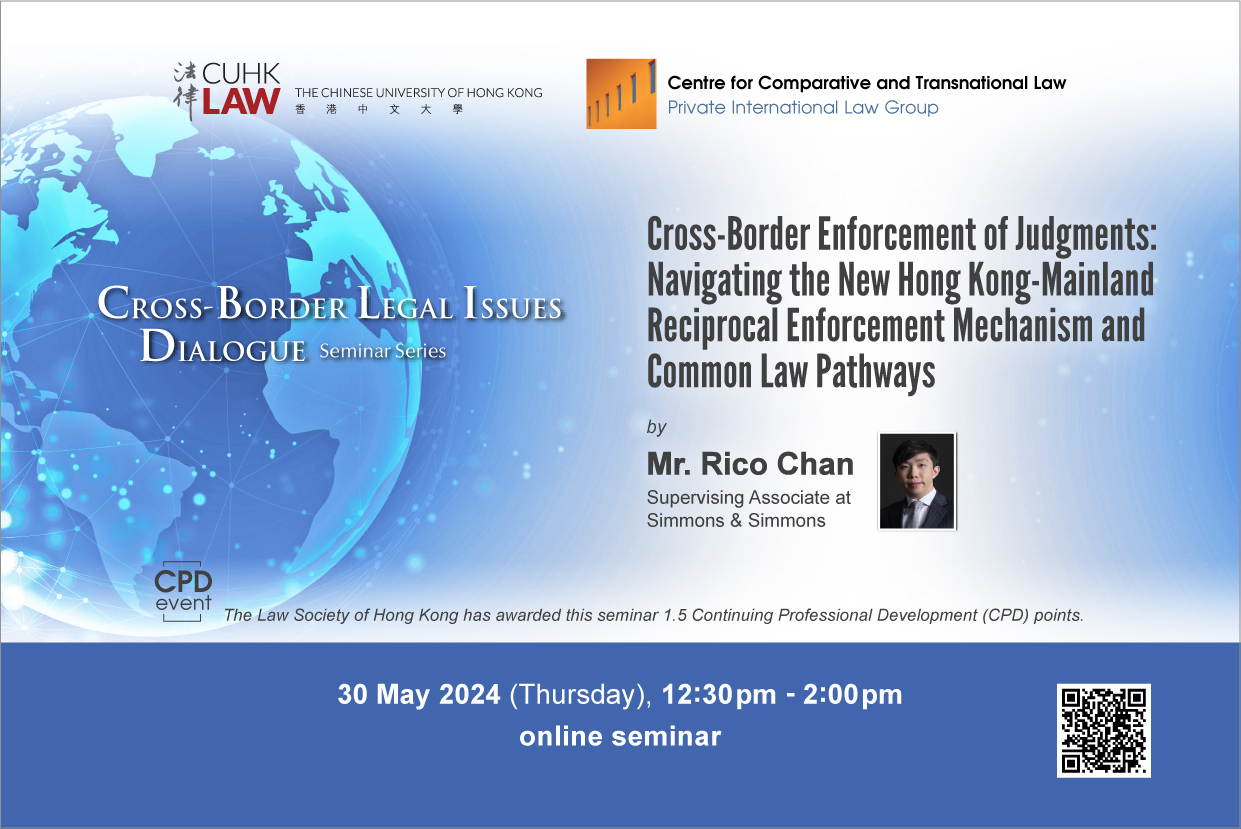Events
CUHK LAW CCTL Cross-Border Legal Issues Dialogue Seminar Series – ‘Cross-Border Enforcement of Judgments: Navigating the New Hong Kong-Mainland Reciprocal Enforcement Mechanism and Common Law Pathways’ by Mr. Rico Chan (Online)
30 May 2024
12:30pm – 2:00pm
Online via Zoom
Mr. Rico Chan
Rico Chan is a Supervising Associate at Simmons & Simmons based in Hong Kong.
Rico advises and represents international businesses in complex and high-value contentious matters, covering employment workplace conflicts, enforcement of judgments and arbitral awards, sale of goods claims, settlement negotiation, mediation, international arbitration, property litigation, technology disputes, commercial frauds, cyber-crimes, insolvency, restructuring and regulatory investigations, which often involve cross-border elements.
Rico completed a secondment with Ant Group, one of the largest tech companies in the world, where he worked in the Legal Department for 1.5 years. During his secondment, he handled a wide range of global employment projects, dispute management work and internal investigations, delivering strategic advice and risk analysis/guidance on employment law issues for Ant’s offices across APAC and EMEA regions. He has also organized various legal trainings for business executives, HR directors and employees.
Before joining Simmons, Rico trained and qualified in another international law firm where he was seconded to its London headquarters for half a year. He has also worked in different cities in Mainland China, such as Beijing and Hangzhou.
This seminar aims to provide a comprehensive overview of the cross-border enforcement of judgments, focusing on the statutory and common law mechanisms, with a special emphasis on the newly enacted Hong Kong-Mainland reciprocal enforcement mechanism. Participants will gain insights into the legal framework that governs enforcement of judgments rendered by courts in other jurisdictions, exploring its legal principles and practical difficulties.
The introduction will set the stage by delineating the statutory mechanisms in place, highlighting the procedural steps and requirements for the enforcement of judgments. This will be followed by an in-depth exploration of the Hong Kong-Mainland reciprocal enforcement mechanism, a landmark development in cross-border legal collaboration. The seminar will dissect the key provisions, its scope, and the differences between the new and old mechanisms.
Moving to the common law mechanism, the seminar will contrast the statutory approach with the traditional common law routes for judgment enforcement. This section will elucidate the principles and precedents that guide the common law process, offering a comparative analysis that underscores the practical considerations for choosing between statutory and common law pathways.
A case study segment will delve into recent new cases that have emerged in the realm of judgment enforcement. This practical exploration will not only bring to light the real-world application of the discussed mechanisms but also examine the judicial reasoning and outcomes that contribute to the evolving legal landscape.
The seminar will conclude with key takeaways, summarizing the critical learning points and providing participants with actionable knowledge. Attendees will leave with a clearer understanding of the complexities of cross-border enforcement of judgments, equipped with the latest information on statutory developments and common law practices. This seminar is designed to empower participants with the knowledge to navigate the intricacies of judgment enforcement in a cross-border context effectively.
Language: English
The Law Society of Hong Kong has awarded this seminar 1.5 Continuing Professional Development (CPD) points.


